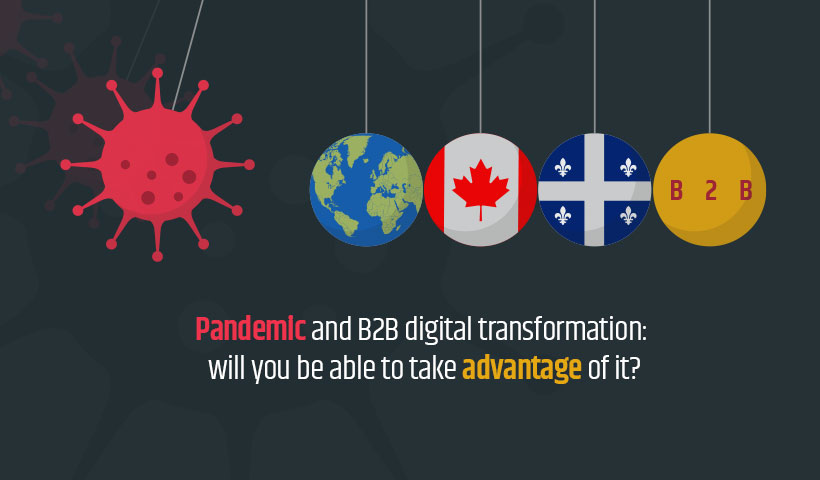
In a previous post, I talked about the opportunity for businesses, in these times of uncertainty, to finally work through their digital transformation, the inevitable transition to a new economy.
It’s one thing to talk about digital transformation as a phenomenon, but what exactly does it mean for society and especially for businesses? To better integrate this transformation, we need to understand what it is, right?
I concluded my previous post by promising a definition of digital transformation, especially for businesses.
The digital transformation according to ten international experts
A promise is a promise. So, I asked more than a dozen men and four women for their take on the topic. Unfortunately, three of the four ladies in question either declined or did not answer my question.
To round it off at ten, I have attached my own definition, which makes three experts from the United States, one from Toronto, one from New Brunswick and five francophones from Quebec and France.
So let’s begin with one of the greatest international experts on the subject.
(Click on the names to access their impressive profiles on LinkedIn).
Dion Hinchcliffe

Here’s my definition: « Digital transformation is more than digitization and automation of your existing business » .
That activity has been going on for more than 40 years, and while useful, is an activity that doesn’t prepare organizations for the very different operating environments and success conditions of the future.
In contrast, digital transformation is a fundamental rethinking of the business itself, its products and services, what market it addresses, and especially what its future business models will be.
A successful digital transformation rethinks and re-imagines the business using the digital art-of-the-possible, as well as what will be possible in the future.
It doesn’t have to be a complete disruption of the existing business, but it should feel like it at the time.
Jeremiah Owyang

If you’ve read the myriad definitions of digital transformation and thought they sounded a decade old, you’re right. Many of the definitions, while certainly appropriate at the time, were focused on digitization over transformation (aka turning paper into PDFs). As a result, the definitions have become either too narrowly scoped or rich with meaningless buzzwords.
Here’s a new working definition (read: it will keep evolving!) that speaks to the modern-day innovator’s charter:
Digital Transformation:
A technological, cultural, and operational shift in which organizations leverage data to deliver customer value, innovate with agility, and sustain vitality.
Shel Holtz

Digital transformation is primarily a culture change. (I define corporate culture as « the way things are done around here. ») Digital transformation means changing the way decisions are made so they’re based on data rather than intuition, company politics, or personal preference.
When data drive decisions, these decisions can be made quickly at lower levels, dramatically reducing the need to move the proposal up the hierarchy for approval after approval.
Like any major organizational change, this requires the right tools and adequate training about how to use them (both tactically and strategically). But while tools are important, digital transformation is primarily about people.
Harold Jarche

The foundation of digital transformation is making our human networks smarter, more resilient, and able to make faster and better decisions. This requires a more democratic organization — loose hierarchies and strong networks.
Less control, and more democracy, is required in order to foster the trusted relationships necessary for knowledge workers to both cooperate and collaborate. Collaboration is working together for a common objective, while cooperation is openly sharing, without any quid pro quo. Collaboration is required to accomplish a task, but cooperation is how we contribute to our knowledge networks from which we can draw inspiration. Both are necessary. In addition, each person requires the discipline of seeking out knowledge, making sense of it on an ongoing basis, and sharing with others at the appropriate times.
What ties cooperation and collaboration together is the engaged individual with the freedom to act. Organizations can ignore this, and impose a structure that inhibits seeking, sense-making, and sharing. If so, collaboration and collaboration will not be effective. The knowledge network will lack sufficient diversity to provide insights for innovation or creativity. Digital transformation is a hollow shell without a democratic foundation.
Maggie Fox

« Culture eats strategy » is a common saying for good reason. If you think « digital transformation » as simply the implementation of new tools and systems, without considering the cultural and behavioural change required – You. Will. Fail.
As a consultant, I had been helping organizations radically re-imagine the way they market and communicate since 2006. In 2013 I went « inside » and was appointed to run digital marketing globally for software giant SAP. The Board asked us to transform the pre-sale customer digital experience. The challenge? We only controlled about 30% of the people and budgets.
We had to convince stakeholders right across an 80,000 person global business to do things differently – the way we wanted them to. Amazingly, we completely replatformed, went mobile-first, redesigned the user experience and reduced complexity by over 80% – all in 30 months. The « One Digital Experience » (1DX) project was successful not only because we selected the best tools and partners, but because we very deliberately took the time to bring people with us, to change the culture around how we worked together (« assume the best intentions » became a mantra) and to over-communicate and create transparency around our commitments and our accomplishments.
Digital transformation is as much – if not more – about people as it is about technology. Forget that at your peril!
Jon Husband

It is important to recognize that we, as humans, have already been digitally “transformed”: virtually everyone uses smartphones all day long and uses some type of computer at work (even if the computer is just a cash register or card reader).
Digital transformation typically refines and/or redefines and integrates IT capabilities into the capacity and business processes of organizations.
At the societal level, digital transformation involves constructive/useful enhancements to augment or redefine most regular human activities, such as voting, receiving government services, education, health care, etc.
At the organisational level – the digital transformation of an organisation means the design and integration of digital capabilities into organisational processes, products and services which, in turn, improve the support and services available to networked individuals, communities and markets.
Claude Malaison

For me, digital transformation in business is defined as: the design and implementation of a new and constantly evolving ecosystem in an enterprise, which encompasses all spheres of activity by flattening hierarchical lines.
That ecosystem uses new technologies and internal and external networks to revitalize content, collaboration spaces, databases, processes and systems so that managers and employees have access to the full range of information and tools they need to reinvent their work and innovate.
Laurent Simon

The real challenge of the digital transformation is the logic of uses and processes. Of course, we have to keep a watchful eye, but above all, we must constantly ask ourselves what technologies bring to our employees, how they contribute to the performance of our value chain and how they ultimately useful to our customers.
In this sense, digital transformation must be seen as an act of collective agility, driven by continuous experimentation inspired by user-centred collaborative innovation.
Fred Cavazza

Digital transformation refers to the changes associated with the systematic use of digital technology in all aspects of our daily lives. It concerns users, consumers, citizens, but also businesses and organisations that need to integrate digital tools and supports to cope with an ever-changing market.
In absolute terms, the digital transformation began 40 years ago with the arrival of the first personal computers, but with the advent of smartphones we are talking about a more global and above all deeper phenomenon: what needed to be digitized or disintermediated has already been digitized.
So I prefer to use the term “digital acceleration”, which is more appropriate to the situation we are experiencing today: a paradigm shift where existing markets are being reconfigured by digital aggregators and platforms (GAFA, Uber, Deliveroo, WeChat…) which are making exchanges more fluid, and where traditional players are being pushed aside by new entrants who are proposing alternative offers with higher added value that are exclusive to digital (pay-per-use, pay-per-subscription…).
Bertrand Duperrin

From my point of view the digital transformation is, to put it simply, to go faster and on a larger scale. This has always been what has been asked of technology. Afterwards, when we can operate faster and on a larger scale, this opens up a whole new field of possibilities, which can range from transforming the business model to repositioning on new sectors of activity.
But wanting to go faster, on a larger scale is nothing new, it is even the very nature of mankind. We have always wanted to go faster from one point to another. Retailers have always wanted to attract more customers and expand their geographical reach.
This desire to go faster and to act on a larger scale has been achieved by individuals using digital tools, the most common example being social networks. Very quickly this created an imbalance between individuals, customers, markets or even a society at large, that was advancing at high speed and with networks and companies that remained in old models with “old” technologies that were not moving as fast.
It was to bridge this speed gap that companies rushed into digital transformation. But they did so by making a major mistake, which explains why today we consider that the digital transformation has not (yet?) been completed.
So the digital transformation is a desire to go faster and with a larger scale impact, together, which requires a change of model to happen. Technology is only a means to achieve this, but it has been made too central to the process, which has made companies forget the idea, the importance, of changing their model.
In conclusion, I would like to thank these nine international experts who participated in this collaborative exercise and mention that in addition to the ExoB2B blog, some experts will be featured in video clips in the form of live interviews with Alain Thériault. So, stay tuned and if you feel like participating and sharing your own definition with us, comment on our various social networks.







